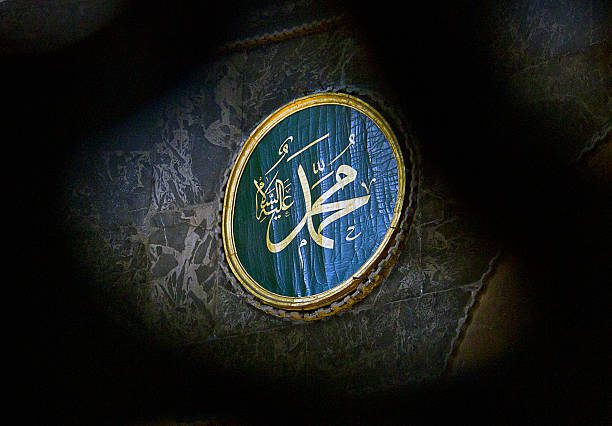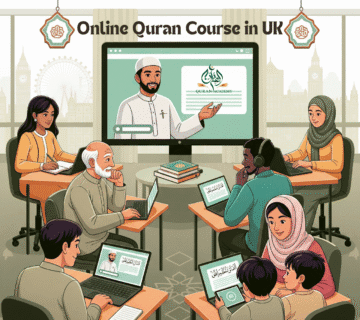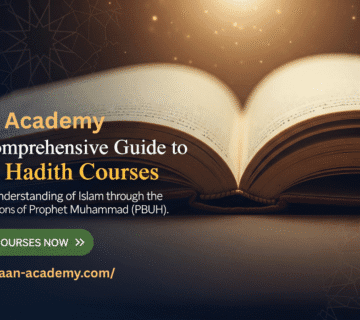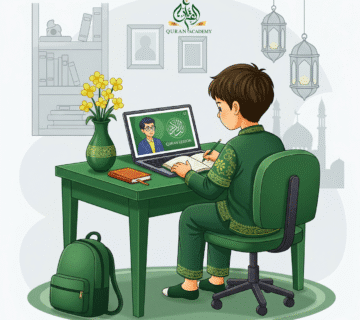![]()
Prophet Muhammad (Muhammad ibn Abdullah ibn Abd al-Muttalib ibn Hashim – محمد بن عبد الله بن عبد المطلب بن هاشم) is considered by Muslims to be the final prophet and messenger of God (Allah – الله) sent to all of humanity. He’s the central figure of Islam, and his life and teachings, along with the Holy Quran, form the very foundation of Islamic faith and practice.
Key Aspects of Prophet Muhammad Life and Why He Matters:
-
Early Life & Beginnings:
- He was born in Mecca (which is now in Saudi Arabia) around 570 CE.
- He became an orphan young and was raised by his grandfather and then his uncle, Abu Talib.
- People knew him for being super honest and trustworthy, earning him the nickname “Al-Amin (الأمين),” The Trustworthy One.
- He married Khadijah, a respected businesswoman, and they had several children.
-
Receiving God’s Message & Prophethood:
- When he was 40, in 610 CE, while meditating in a cave on Mount Hira (near Mecca), he received his very first message from God through the Angel Gabriel (Jibril – جبريل).
- These messages kept coming for 23 years and were eventually put together to form the Holy Quran (القرآن الكريم), which is the sacred scripture of Islam.
- His main mission was to call people to worship One God (Allah – الله) and to stop worshipping idols or multiple gods.
-
Preaching & Facing Hardship:
- He started sharing his message of Tawhid (توحيد) – the Oneness of God – first privately, then publicly in Mecca.
- His message challenged the old ways of the Meccan elite, like their polytheistic beliefs and social structures. This led to serious persecution for him and his early followers.
-
The Hijra (الهجرة) – Moving to Medina:
- In 622 CE, facing growing persecution and even a plot to kill him, Prophet Muhammad and his followers moved from Mecca to Yathrib (which was later renamed Medina – المدينة المنورة).
- This big move, called the Hijra, marks the start of the Islamic calendar (Hijri calendar).
- In Medina, Prophet Muhammad established the first Islamic state, bringing different tribes together and setting up a fair and just society.
-
Battles & Taking Mecca:
- The new Muslim community in Medina faced military threats from Mecca, leading to some key battles (like Badr, Uhud, and the Trench).
- In 630 CE, Prophet Muhammad returned to Mecca with a large Muslim army and peacefully took control of the city, clearing the Kaaba (الكعبة) of all idols.
-
Building the Islamic State & His Final Pilgrimage:
- He laid down the principles of Islamic law (Sharia – شريعة) and how to govern, always emphasizing justice, compassion, and human rights.
- In 632 CE, he performed his last pilgrimage to Mecca, known as the Farewell Pilgrimage (حجة الوداع). During this time, he gave an incredibly important sermon that outlined core Islamic principles.
-
His Passing:
- Prophet Muhammad passed away in Medina in 632 CE, at the age of 63. He’s buried in the Prophet’s Mosque (Masjid an-Nabawi – المسجد النبوي) in Medina.
Why He’s So Significant in Islam:
- The Final Prophet: Muslims believe he’s the “Seal of the Prophets,” meaning no more prophets will come after him. His message is considered the final and complete guidance for humanity.
- The Perfect Role Model (Uswah Hasanah – أسوة حسنة): His entire life (Sunnah – سنة), including his actions, sayings (Hadith – حديث), and character, serves as the ultimate example for Muslims on how to live a life that pleases God.
- The Deliverer of the Quran: He was the human through whom the Quran was revealed, making him absolutely central to Islamic scripture.
- The Unifier: He brought together warring tribes in Arabia under the banner of Islam, creating a strong, just community.
- A Mercy to Humanity: He’s often called “Rahmatul-lil-‘alameen (رحمة للعالمين)” – meaning “Mercy to the worlds” – because of his teachings of compassion, justice, and universal brotherhood.
It’s important to remember that for Muslims, Prophet Muhammad isn’t worshipped (worship is only for Allah alone). Instead, he’s deeply loved, respected, and his teachings are meticulously followed as the path to success in this life and the Akhirah (الآخرة – Hereafter).
Early Life and the Call to Prophethood of prophet Muhemmed
Born in Mecca around 570 CE, Muhammed (PBUH) emerged into a pre-Islamic Arabia characterized by tribal divisions and polytheistic practices. He garnered renown for his unwavering honesty and compassion, earning epithets like “Al-Sadiq” (the truthful) and “Al-Amin” (the trustworthy).
At the age of 40, while seeking solace in contemplation on Mount Hira, Muhammed (PBUH) received the first revelation from God through the Angel Gabriel. This marked the beginning of his prophethood, entrusting him with the responsibility of conveying a message of monotheism and ethical living. Here, the first text of the Qur’an came down, where God said
ٱقۡرَأۡ بِٱسۡمِ رَبِّكَ ٱلَّذِي خَلَقَ (1) خَلَقَ ٱلۡإِنسَٰنَ مِنۡ عَلَقٍ (2) ٱقۡرَأۡ وَرَبُّكَ ٱلۡأَكۡرَمُ (3) ٱلَّذِي عَلَّمَ بِٱلۡقَلَمِ (4) عَلَّمَ ٱلۡإِنسَٰنَ مَا لَمۡ يَعۡلَمۡ
Facing Persecution and Building a Community
Muhammed’s (PBUH) message challenged the established social order, angering the powerful Meccan elite whose livelihoods depended on idol worship. He and his early followers faced persecution, ridicule, and even violence. Yet, they persevered, finding strength in prayer and clinging to their faith.
Undeterred, Muhammed (PBUH) focused on building a strong Muslim community based on principles of equality, justice, and social responsibility. He established the first mosque – a space dedicated to worship and community gathering – in his own house.
Hijra prophet Muhammed and the Ascendancy of Islam
In 622 CE, facing mounting persecution, Muhammed (PBUH) and his followers undertook the historic migration (Hijra) from Mecca to Medina. This pivotal event marks the beginning of the Islamic calendar.
In Medina, the Prophet (PBUH) established the first Islamic state, acting as a political leader and spiritual guide. He forged alliances with other tribes, laying the groundwork for a thriving Muslim community. Throughout his time in Medina, Muhammed (PBUH) received further revelations, compiled in the Quran, the holy book of Islam. He led his followers in defending themselves against attacks from Mecca, ultimately securing a peaceful return to the city in 630 CE.
Farewell Sermon and Enduring Legacy of prophet Muhammed
Ten years after the Hijra, while performing the Hajj pilgrimage, Muhammed (PBUH) delivered his final sermon, known as the “Farewell Sermon.” In this powerful address, he emphasized the importance of monotheism, ethical conduct, and social justice. Shortly after, he passed away in 632 CE, leaving behind a legacy that continues to inspire and guide millions.
The Prophet’s Character: A Model for Humanity
Prophet Muhammed (PBUH) embodies the ideal human character. His life is a testament to his:
- Devotion to God: He was entirely dedicated to worshipping and serving one God, setting an example for all Muslims.
- Truthfulness and Integrity: Known for his honesty, he instilled trust and respect from his followers and even his adversaries.
- Compassion and Generosity: He cared deeply for the poor, orphans, and the disadvantaged, demonstrating immense generosity with his possessions and time.
- Forgiveness and Patience: Despite facing persecution, he advocated forgiveness and showed unwavering patience in the face of hardship.
- Justice and Equality: He emphasized the importance of treating all people with respect and upholding justice for everyone.
Core Teachings of Islam
Muhammed’s (PBUH) central message revolved around the belief in one God (Allah) and the importance of righteous living. Islam emphasizes five central pillars:
- Shahadah (Declaration of Faith): Publicly declaring belief in one God and the prophethood of Muhammed (PBUH).
- Salah (Prayer): Performing five daily prayers at specific times, connecting directly with God.
- Zakat (Almsgiving): Giving a portion of one’s wealth to charity, promoting social responsibility and helping the less fortunate.
- Sawm (Fasting): Abstaining from food, drink, and other activities during the month of Ramadan, fostering self-discipline and empathy for the less fortunate.
- Hajj (Pilgrimage): Undertaking a pilgrimage to Mecca at least once in a lifetime, promoting unity and equality among Muslims.
A Lasting Impact on the World Stage
Prophet Muhammed’s (PBUH) influence extends far beyond the realm of religion. His teachings laid the foundation for a new civilization that valued knowledge, education, and social welfare.
Islamic Civilization’s Golden Age: Islam flourished, giving rise to a golden age of scientific and intellectual advancement. Muslim scholars made significant contributions in mathematics,
The works of the Prophet Muhammed
Prophet Muhammed’s (PBUH) life wasn’t just about religious revelation. His actions and leadership had a profound impact, shaping Islam and leaving a lasting legacy. Here are some of his key achievements:
-
Founding Islam and Unifying Arabia:
- Before Muhammed (PBUH), Arabia lacked religious and social unity. He established Islam as a monotheistic religion, uniting diverse tribes under a common faith.
-
Building a Just and Compassionate Society:
- Islam emphasizes social justice and helping the less fortunate. Muhammed (PBUH) established a community based on equality, caring for the poor, orphans, and the marginalized.
-
The Quran and the Preservation of Divine Message:
- The Quran, believed to be the literal word of God revealed to Muhammed (PBUH), serves as Islam’s foundation. He ensured its meticulous preservation for future generations.
-
The Establishment of the First Islamic State:
- In Medina, Muhammed (PBUH) created the first Islamic state, demonstrating a model of governance that blended political leadership with religious guidance.
-
The Hijra and the Islamic Calendar:
- The historic migration (Hijra) from Mecca to Medina marked a turning point, establishing a new era and the beginning of the Islamic calendar.
-
Promoting Education and Knowledge:
- Islam emphasizes learning and seeking knowledge. Muhammed (PBUH) encouraged education and intellectual pursuit, laying the groundwork for a golden age of Islamic scholarship.
-
Interfaith Dialogue and Tolerance:
- While establishing Islam, Muhammed (PBUH) promoted respectful dialogue with people of other faiths, advocating for religious tolerance within the new Muslim community.
-
The Farewell Sermon and Enduring Legacy:
- His final sermon emphasized core Islamic values – monotheism, ethical conduct, and social justice – leaving a lasting message for generations to come.
-
Personal Qualities as a Role Model:
- Throughout his life, Muhammed (PBUH) embodied exemplary character traits like honesty, forgiveness, compassion, and unwavering faith, inspiring millions to follow his example.
-
The Golden Age of Islamic Civilization:
- Muhammed’s (PBUH) teachings laid the foundation for a flourishing Islamic civilization that made significant contributions to science, mathematics, medicine, and philosophy, impacting the world for centuries to come.
These achievements represent the far-reaching impact of Prophet Muhammed (PBUH). His legacy extends far beyond the realm of religion, shaping societies and influencing the course of human history.
Finally you can join to Quran Academy to learn more about Islam
Book Free Trial Class
Book Free Trial Class





I like this site its a master peace ! .